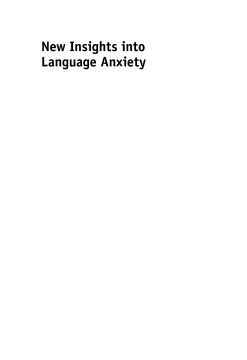
BOOK
New Insights into Language Anxiety
Christina Gkonou | Mark Daubney | Dr. Jean-Marc Dewaele
(2017)
Additional Information
Book Details
Abstract
This book provides an overview of current theory, research and practice in the field of language anxiety and brings together a range of perspectives on this psychological construct in a single volume. Chapters in the volume are divided into three sections. Part 1 revisits language anxiety theory, showing that it can be viewed as a complex and dynamic construct and that it is linked to other psychological variables, such as the self and personality. In Part 2, a series of contextualised studies on language anxiety are presented, with a key feature of these studies being the diverse research designs which are applied in different instructional settings across the globe. Part 3 bridges theory and practice by presenting coping strategies and practice activities with a view to informing classroom practice and pedagogical interventions.
Christina Gkonou is Lecturer in TESOL and MA TESOL Programme Director in the Department of Language and Linguistics at the University of Essex, UK. Her research interests include language anxiety and emotions, and teacher education.
Mark Daubney is Adjunct Professor in the Department of Languages and Literatures at the School of Education and Social Sciences-Polytechnic Institute of Leiria, Portugal. His research interests are teacher education, and affective factors - especially anxiety and motivation - in classroom interaction.
Jean-Marc Dewaele is Professor in the Department of Applied Linguistics and Communication, Birkbeck, University of London, UK. His research interests include individual differences in multilingualism and emotion and he is President of the International Association of Multilingualism.
Much of the current research in SLA and the neurosciences points to the strong influence of affective factors, such as anxiety, on the process of language learning. With chapters from important experts in the field, this book makes a valuable contribution to understanding the research and theoretical proposals regarding anxiety and also makes useful suggestions for reducing its influence in the classroom.
In this excellent and much-needed collection, the authors bring inspiring theoretical and empirical insights to one of the most perplexing affective factors in language learning and teaching: language anxiety. It offers insightful and refreshing perspectives for research within diverse methodologies for contexts and participants across the globe!
As someone who both lives and works in a Turkish speaking environment, and still suffers from LA even after 30 years, I felt like a patient listening to his doctor. I found this title most enlightening, especially in relation to identifying and treating its symptoms.
I would certainly recommend adding this title to reading lists for courses at all higher levels of teacher development.
I feel participants would be made much more aware of both causes and effects of LA. They would also of course be more knowledgeable in how to deal with such matters in a professional manner.
Wayne Trotman, İzmir Kâtip Çelebi University, Turkey
This collection is recommended to anyone interested in learning about the latest progress of LA. Importantly, it can also be used as a reference for researchers to
learn how to do LA research in the new dynamic era.
Honggang Liu, Northeast Normal University, China
Table of Contents
| Section Title | Page | Action | Price |
|---|---|---|---|
| Contents | v | ||
| Contributors | vii | ||
| 1 Introduction | 1 | ||
| Part 1 Theoretical Insights | 9 | ||
| 2 An Overview of Language Anxiety Research and Trends in its Development | 11 | ||
| 3 On the Misreading of Horwitz, Horwitz and Cope (1986) and the Need to Balance Anxiety Research and the Experiences of Anxious Language Learners | 31 | ||
| Part 2 Empirical Investigations | 49 | ||
| 4 Anxiety and L2 Self-Images: The ‘Anxious Self’ | 51 | ||
| 5 Are Perfectionists More Anxious Foreign Language Learners and Users? | 70 | ||
| 6 Social Anxiety and Silence in Japan’s Tertiary Foreign Language Classrooms | 91 | ||
| 7 Do You See What I Feel? An Idiodynamic Assessment of Expert and Peer’s Reading of Nonverbal Language Anxiety Cues | 110 | ||
| 8 Towards an Ecological Understanding of Language Anxiety | 135 | ||
| 9 Exploring the Relationship between Anxiety and Advanced Hungarian EFL Learners’ Communication Experiences in the Target Language: A Study of High- vs Low-Anxious Learners | 156 | ||
| Part 3 Implications for Practice | 175 | ||
| 10 Anxious Language Learners Can Change Their Minds: Ideas and Strategies from Traditional Psychology and Positive Psychology | 177 | ||
| 11 The Links Between Self-Esteem and Language Anxiety and Implications for the Classroom | 198 | ||
| 12 Conclusion | 217 | ||
| Index | 224 |
